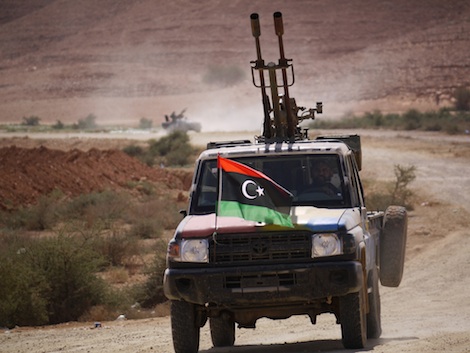By George Grant.

Sufageen Valley, 19 October:
National Congress President Mohamed Magarief has condemned the recent escalation of hostilities in Bani Walid in . . .[restrict]the latest sign of a growing disconnect between leaders in Tripoli and commanders on the ground.
Save for a brief clash said to have lasted for around half an hour, the situation around the hill-town is broadly calm today following the declaration of a 48-hour ceasefire to allow civilians time to evacuate in preparation for a final assault.
“The GNC president expresses his displeasure about the armed escalation of the situation which forced itself on the ground in Bani Walid” read a statement received today.
“[The conflict has] resulted in a humanitarian crisis which requires a renewed commitment to providing humanitarian assistance to those affected.”
Fierce fighting took place in and around Bani Walid yesterday as ground forces advanced deep into enemy territory before withdrawing to their positions to enable the ceasefire to take effect.
At least eight soldiers are known to have died in clashes on Wednesday and Thursday, whilst 12 people are reported to have been killed in Bani Walid.
“We reached a very advanced point, but withdrew to let the families out”, said Laith Mohammed, one of the soldiers involved in the fighting yesterday. “We do not want to kill civilians”.
Inside Bani Walid, however, there does not seem to be much of an appetite for leaving.
“All of the families are still there”, said Abdulsalam Alfukahi, a member of Bani Walid’s negotiating team charged with finding a peaceful settlement to the crisis.
“They decided they do not want to go. They will stay at their houses and they will live or they will die”.
At a forward base some 25 miles east of Bani Walid, predominantly Misratan soldiers – who insist they are part of the national army and under the control of the government – speak of their desire for a swift conclusion to the conflict, which they say bears more than a little resemblance to last year’s war.
“We fight as we fought before”, said Salah Alem, a school teacher in normal life. “Against Gaddafi. We heard that there are a lot of people who support him still in Bani Walid.”
A scraggy bowl of heat and dust, the position in which these men now sit, known locally as the Sufageen Valley, was itself in the hands of Bani Walid as recently as Wednesday. It was taken following an audacious assault in which the advancing forces scaled the 45-degree slopes and took the defenders by surprise from the high-ground. A solitary Libyan flag now flies from a makeshift mast erected atop the foremost peak directly overlooking the valley.
Along the road on the approach to the base, the army is preparing itself for the final offensive. A fuel depot and field hospital have been set-up some five miles back, whilst lorries carrying artillery, tanks, Grad rocket launchers and ammunition advance towards the front.

At one point, what can only be described as a mobile mosque whizzes past, a van complete with an imam and loudspeakers blaring out Islamic prayers.
The soldiers say that the heavy weaponry is for use only in open areas, and as a contingency in case of a breakout by forces from Bani Walid. Consistent with their stated objective of avoiding civilian casualties, they insist that only light weapons will be used in the coming assault, which now seems all but a certainty.
In his statement, Magarief warned of the possibility of a wider conflagration in Libya if a political resolution to the Bani Walid crisis is not found:
“[We reaffirm] the need to find a peaceful solution to the crisis, and to approve an immediate halt to the use of force… to ensure a final solution to this crisis and [to prevent] what may potentially arise from similar crises between other Libyan regions as a result of social and tribal conflicts.”
With tomorrow marking the first anniversary of Qaddafi’s death, however, momentum on the ground looks to be moving definitively towards a forceful resolution of what those involved see as the final chapter of the revolution.
“We are here to finish this problem”, said Laith Mohammed. “Bani Walid is like a state within a state and it needs to stop.”
Another soldier, Ibrahim Bin Saud, echoed the sentiment. “God willing, this will be the last battle against Gaddafi. Libya will be at peace after this.” [/restrict]









